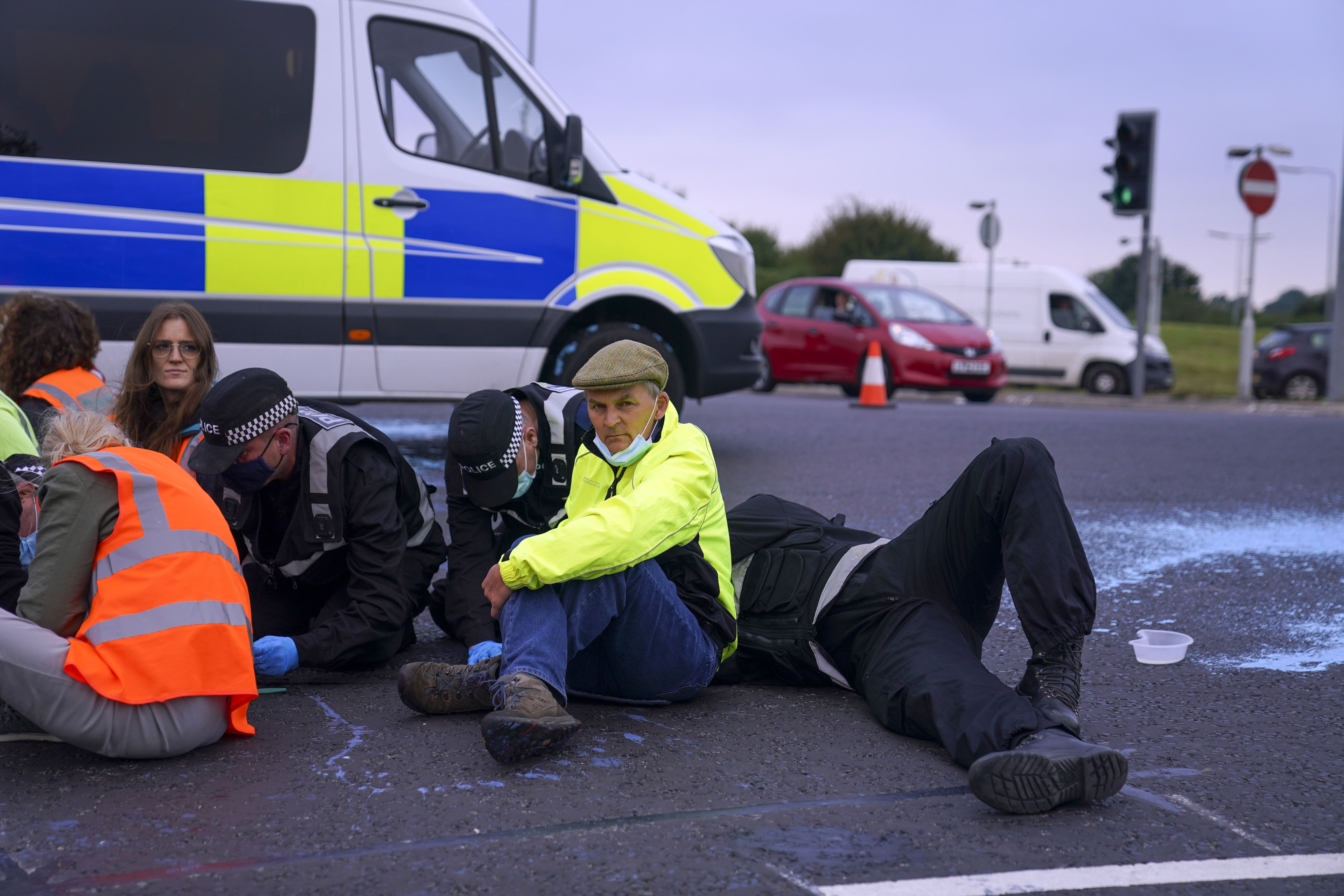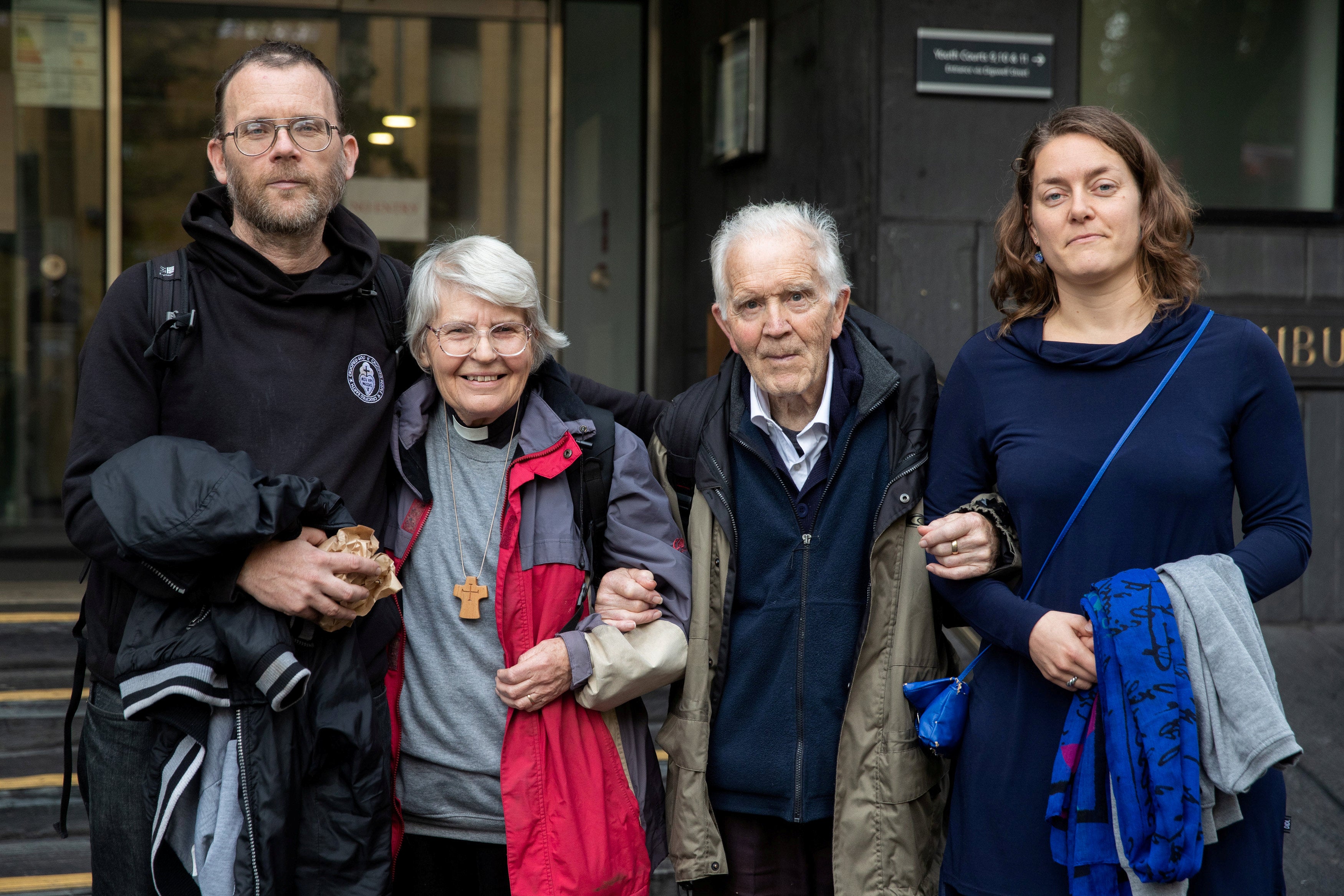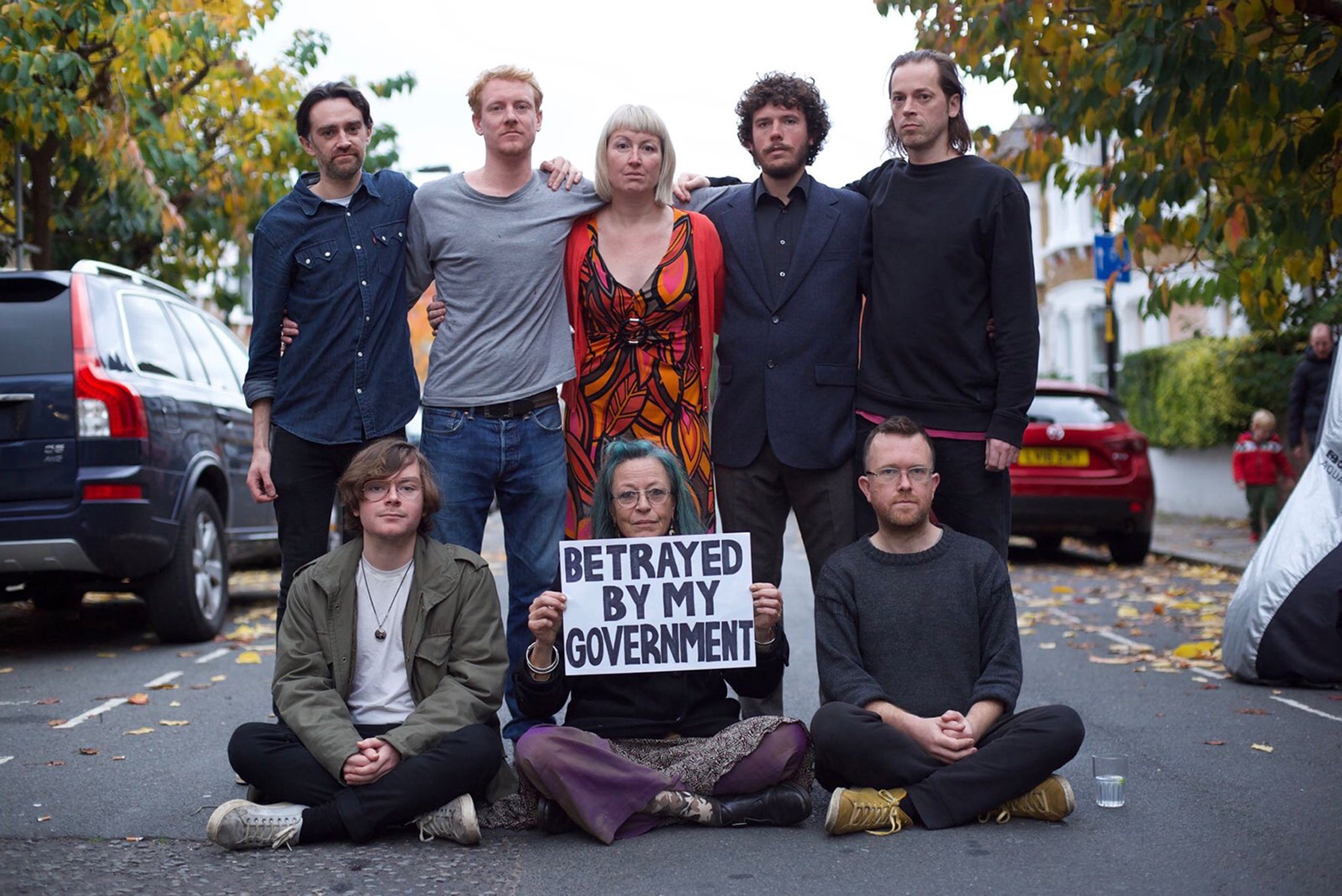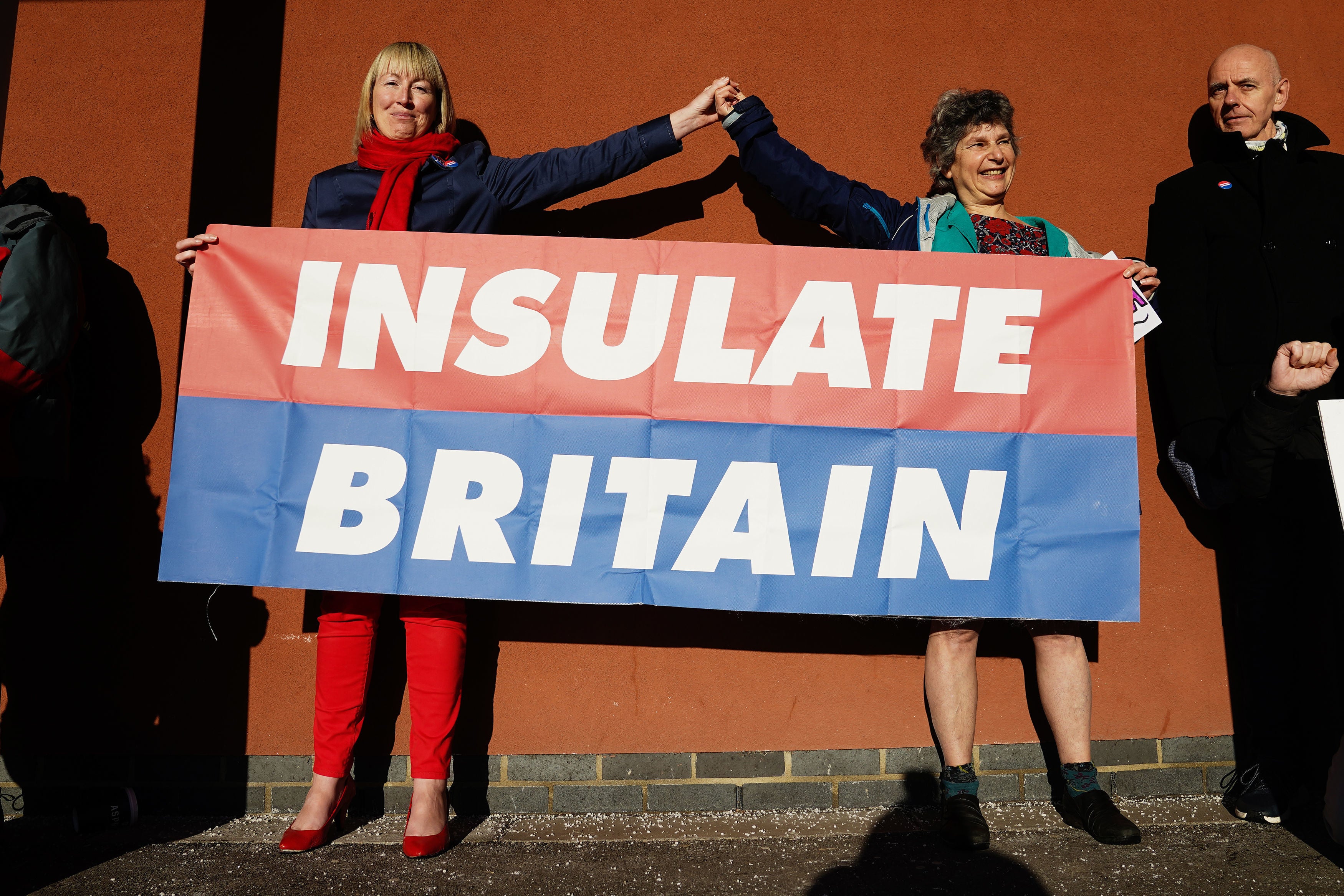Could the policing bill stifle Insulate Britain and other disruptive climate protests?
Amendments to controversial bill will make it harder to hold government to account over climate crisis, Insulate Britain members tell Emma Snaith


Your support helps us to tell the story
From reproductive rights to climate change to Big Tech, The Independent is on the ground when the story is developing. Whether it's investigating the financials of Elon Musk's pro-Trump PAC or producing our latest documentary, 'The A Word', which shines a light on the American women fighting for reproductive rights, we know how important it is to parse out the facts from the messaging.
At such a critical moment in US history, we need reporters on the ground. Your donation allows us to keep sending journalists to speak to both sides of the story.
The Independent is trusted by Americans across the entire political spectrum. And unlike many other quality news outlets, we choose not to lock Americans out of our reporting and analysis with paywalls. We believe quality journalism should be available to everyone, paid for by those who can afford it.
Your support makes all the difference.After just four months, Insulate Britain’s protests have put the seemingly dull issue of retrofitting homes on everyone’s lips.
The organisation of fewer than 200 active members have blocked motorways and glued themselves to some of the UK’s busiest roads on 18 separate days in 2021. More than 850 arrests were made and 10 activists have been jailed.
These protests, calling for the proper insulation of every home in Britain by 2030, garnered widespread media attention and prompted Boris Johnson to call for new powers against activists causing disruption to “insulate them snugly in prison”.
On Monday, the House of Lords is set to vote on amendments to the controversial Police, Crime, Sentencing and Courts Bill sparked by Insulate Britain’s protests last year. Activists across the country took to the streets on Saturday in “Kill the Bill“ protests to call on the Lords to reject the bill.
The proposals include tougher sentences for blocking motorways and allowing police officers to stop and search anyone at a protest “without suspicion”.
So why is causing disruption to ordinary people’s lives so key to Insulate Britain’s strategy? And what impact could the policing bill have on future protests and the broader climate movement as time runs out to halt the worst effects of global heating?
‘Disruption is important’

Ten Insulate Britain members have already been jailed for contempt of court for breaching injunctions banning their protests blocking roads, with a further seven activists handed suspended sentences.
Among those is 79-year-old Reverend Sue Parfitt, who is also one of a group of Extinction Rebellion activists cleared by a jury on Friday for obstructing a London train at rush hour in 2019.
The retired family therapist from Bristol, who has now been arrested 12 times, was handed a suspended sentence in December for her part in Insulate Britain protests last year.
She told The Independent that in letters she sent out at Christmas, she wrote: “This might sound a bit odd to you, but I may be in prison for Christmas.”
Reverend Parfitt added: “The idea of sending peaceful protesters to prison is nonsense, but our job is to follow this through and do what’s needed.”
She admitted that Insulate Britain’s roadblocks were “extremely irritating and upsetting for the motorists,” but said that “it’s nothing compared with the disruption that’s coming down the line with the climate crisis”.
“I’m elderly and time seems to me to be very short,” she added. “I haven’t got time to ponder.”
Critics of Insulate Britain say that blocking roads impacts ordinary people and harms their cause. Drivers appeared to grow angrier as the protests continued, with motorists filmed dragging activists out of the road and even nudging their vehicles into the backs of protesters.
Indeed, a YouGov poll from early October last year found that 51 per cent of Britons were strongly opposed to the actions of Insulate Britain compared to 37 per cent two weeks earlier between 15 and 16 September.
Helping break up the group’s demonstrations cost police forces at least £4.3 million, an investigation also found.

But Dr Graeme Hayes, a reader in political sociology at Aston University, said that Insulate Britain’s tactics are much more likely to be successful than less disruptive protests.
“Disruption is important,” he said. “People have become desensitised to marches and petitions.”
“They [Insulate Britain] are here to do a specific job, which is to raise the profile of home insulation. They do not depend on establishing themselves as a legitimate organisation like Greenpeace or Friends of the Earth.”
He added: “Whether people like Insulate Britain or not is almost irrelevant.”
Media attention and ‘growing concrete’
Certainly, Insulate Britain has managed to put the issue of home insulation in the headlines and keep it there for weeks.
Before the group’s first roadblock in September, insulation was hardly at the forefront of people’s minds despite the UK’s houses being among the draughtiest and least energy-efficient in Europe. An estimated four million UK households also live in fuel poverty.
But is any press really good press? While it is very hard to find anyone who is against insulating homes, some sections of the media focused overwhelmingly on Insulate Britain’s tactics rather than its cause.

Protesters have been labelled “eco-zealots” and reports emerged of their actions disrupting the lives of vulnerable people, including a girl’s journey to her special needs school and an NHS worker trying to get home to his sick child.
But it is unlikely that many people will come out against insulating homes just because they get annoyed at protesters, Dr Hayes pointed out, adding: “It’s simply a sensible, rational policy decision, which delivers social and climate wins.”
Sometimes negative coverage of protests has even worked in Insulate Britain’s favour, one member claimed.
Notably, a clip of TalkRadio presenter Mike Graham insisting that it’s possible to “grow” concrete in an exchange with Insulate Britain member Cameron Ford became a viral hit.
When asked about his job as a carpenter and whether cutting down trees is “sustainable”, Mr Ford pointed out that, unlike concrete, trees grow back. Mr Graham hit back by (incorrectly) claiming that you can grow concrete.
Mr Ford said that the absurd exchange helped win some people over to Insulate Britain’s cause.
He said: “People messaged me saying ‘I saw that and I realised that you guys are human’. They saw what we’re up against.
“I’d reply and say ‘I’m pleased you found that funny. What’s not funny is the state of fuel poverty in this country.’”
The 31-year-old carpenter from Cambridge said that through his work in the building industry he has seen firsthand how poorly both new and old homes in the UK are insulated. He was drawn to Insulate Britain as he felt the issue hadn’t been “properly spelt out to” the public.
“Through our civil disobedience, we have a platform to tell the general public how straightforward this is, and how it’s criminal that the government hasn’t got a proper national retrofit strategy,” he said.
‘Insulate Britain has increased the stakes’
But has this wave of media attention translated into any results for Insulate Britain with the government?
The government produced its Heat and Building strategy in October last year, which it had already been working on for two years. It includes plans to improve insulation in social housing and for those in fuel poverty.
But climate campaigners say it doesn’t go far enough, with plans to roll out home insulation well below the levels advised by the Climate Change Committee and little support for homeowners or private landlords.
In March, ministers scrapped the green homes grant, which would have offered households assistance of up to £10,000 to install home insulation.
While Insulate Britain’s protests may not have garnered any further government action on home insulation to date, Dr Hayes said the group has certainly “increased the stakes” on the issue of retrofitting homes.
‘The policing bill is part of a broader attack on climate activism’
Emboldened by the angry response to Insulate Britain from some members of the public, the government tabled amendments to its Police, Crime, Sentencing and Courts Bill in November that appeared to directly target the group.
They include tougher sentences for blocking motorways and allowing police officers to stop and search anyone at a protest “without suspicion”. Anyone an officer “reasonably believes” may lock onto or obstruct major transport works could be stopped.
Even without these amendments, the bill has been condemned as “draconian” for new powers that would allow the home secretary to ban protests because they might be “seriously disruptive” — including being too noisy.
The government made clear in policy papers from July 2021 that the bill’s original measures targeting protests are a direct response to disruptive Extinction Rebellion and Black Lives Matter demonstrations. It said the bill “will improve the police’s ability to manage such protests, enabling them to balance the rights of protesters against the rights of others to go about their daily business”.

On Monday, the House of Lords will vote on the late-stage amendments sparked by Insulate Britain protests.
Unlike the rest of the bill, where peers can only send amendments back to the Commons to be reconsidered, as the new amendments were introduced in the Lords they will fall if peers vote against them. Human rights organisations are calling on peers to do exactly that.
Mark Johnson, legal and policy officer at Big Brother Watch, said: “The government’s move to add Orwellian anti-protest amendments to the policing bill at this late stage is nothing short of a cynical attempt to bypass parliamentary scrutiny.
“If their intention is to design measures to silence specific groups, then this is an unacceptable way to make law.
“Members of the House of Lords have the opportunity to stop these proposals in their tracks and must reject them outright.”
Jun Pang, Policy and Campaigns Officer at Liberty, added: “Protest is not a gift from the state, it’s a fundamental right. But this government – through the original bill and the recent amendments – wants to make it harder for all of us to protest without breaking the law.
“This threat of criminalisation is aimed at deterring all of us from holding the state to account and will have a particular impact on communities that already bear the brunt of over-policing and surveillance.
“It means that protest becomes the domain only of those willing to risk prison for it, and even for them, the bill’s new ‘Protest Banning Orders’ heighten the risks and stakes substantially.”

But some academics and campaigners believe that even if the policing bill and all its amendments are passed, disruptive protests like those of Insulate Britain will continue to flourish.
Dr Oscar Berglund, a lecturer in international public and social policy at the University of Bristol, argued that the bill is “unenforceable”.
“It tries to stop disruptive protests. But protesters will continue to be disruptive because it’s the only protest that works,” he said. However, Dr Berglund admitted that the bill could make life “a lot more difficult” for protesters.
He said it is part of a broader attack on growing environmental activism around the world. Last year, Dr Berglund helped coordinate a letter signed by more than 400 leading scientists and academics saying that activists are being targeted at a pivotal time in the fight against global heating.
“It’s an attempt by states to allow a few more good years of fossil fuel extraction and burning,” he claimed.
Are ‘pop-up’ protest groups the future of climate activism?

Insulate Britain member Biff Whipster certainly has no intention of slowing down his activism in the face of the policing bill.
Asked about its implications, he said: “If anything, it’s made me more committed.
“I’m not going to rest until I see this government collapse or start to take the lives of its citizens and the climate crisis seriously”
The 54-year-old from Canterbury has been arrested 17 times, making him one of the group’s more active members. He was handed a suspended sentence in December for contempt of court for breaching injunctions banning Insulate Britain’s roadblocking protests.
The former business analyst said he gave up his corporate job to lead a “more sustainable life” and believes that Insulate Britain’s protests are working.
“More people beginning to become aware,” he said. “They may have said ‘get out the bloody road’ but they understand why we’re doing it. And that to me that is success.”
He added: “Even some police officers have quietly told us off camera that they think what we’re doing is brilliant, and to keep it up.”

Police intelligence heard in court suggests that Insulate Britain members will resume their protests in the spring. But how long can we really expect to see the group blocking roads?
Dr Hayes has predicted interest from that media and politicians in Insulate Britain will inevitably wane at some point.
“Novelty is important,” Dr Hayes explained, comparing the Insulate Britain protests with the recent Extinction Rebellion protests.
In April 2019, XR was able to draw significant media and political attention by occupying central London for nearly two weeks. But since then similar protests have brought “diminishing returns”.
“The police are better prepared, intelligence develops, and the media has moved on,” he said.
Instead, Dr Hayes believes another disruptive climate group will eventually emerge, learning the lessons of its predecessors.
He described Insulate Britain as a “pop-up” protest group, saying it represents the future of disruptive climate protests. The group shows a different way forward, he said, adding: “Disband, rename and suddenly you’re fresh in the news again.”
He continued: “There are still lots of open questions about the government’s home insulation policies. But the conversation will move on very quickly to boilers and heat pumps, electric vehicles and charging infrastructure.”
But Dr Berglund argued that Insulate Britain “overestimates” the extent to which other people are likely to join its actions.
“There’s a limited pool of people who are willing to risk that much,” he said. “I don’t think we are all of a sudden going to see thousands of people joining.”

Whether or not Insulate Britain are back on the roads anytime soon, the policing bill looks set to make protesters’ lives much more difficult and dissuade others from joining demonstrations in the first place.
But the most committed activists will likely continue to join actions regardless, whatever new measures the government introduces.
Protester Mr Whipster said: “The government knows that business as usual is a death sentence for the planet, yet they’d rather imprison peaceful protesters than quell their greed-fueled love of fossil fuels. The only thing we have left is non-violent protests.”
The Home Office has been approached for comment, but speaking about the bill late last year, home secretary Priti Patel said: “Nobody should have unchecked rights to endanger the public – and themselves – while causing misery for millions in the name of protest.
“There are numerous legitimate ways in which activists can peacefully campaign for meaningful change, and it is right that those who instead choose to pursue a path of anti-social, dangerous disruption should face the prospect of jail.
“It is totally unacceptable that police should be spending their days ungluing faces from dangerous roads. They should be in our communities protecting the vulnerable people who need them most.
“That’s why our Police, Crime, Sentencing and Courts Bill is so necessary. The public expects everyone in Parliament to stand up for the hard-working, law-abiding majority, stand up for the police and back the Bill.”



Join our commenting forum
Join thought-provoking conversations, follow other Independent readers and see their replies
Comments